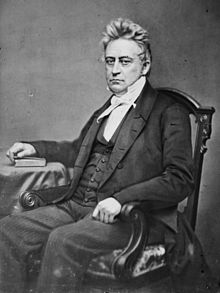Marshall Spring Bidwell
Marshall Spring Bidwell | |
|---|---|
 | |
| Member of the Legislative Assembly of Upper Canada for Lennox & Addington | |
| In office 1824–1836 | |
| Speaker of the Legislative Assembly of Upper Canada | |
| In office 1829–1830 | |
| Preceded by | John Wilson |
| Succeeded by | Archibald McLean |
| In office 1835 | |
| Preceded by | Archibald McLean |
| Succeeded by | Archibald McLean |
| Personal details | |
| Born | February 16, 1799 Stockbridge, Massachusetts |
| Died | October 24, 1872 (aged 73) New York City, New York |
| Relations | Barnabas Bidwell (father) |
| Occupation | Lawyer |
Marshall Spring Bidwell (February 16, 1799 – October 24, 1872) was a lawyer and political figure in Upper Canada.
He was born in Stockbridge, Massachusetts in 1799, the son of politician Barnabas Bidwell. His family settled in Bath in Upper Canada before the War of 1812. He studied with a law firm in Kingston and was called to the Ontario Bar in 1821. When his father was unseated in 1821 based on allegations of misappropriation of funds in Massachusetts, Bidwell presented himself as a candidate but was declared ineligible. In the April 1823 Lennox and Addington by-election, Bidwell ran against George Ham of Bath where Ham won by 13 votes.
Canadian political career
In 1824, Bidwell was allowed to run for office and was elected to the 9th Parliament of Upper Canada representing Lennox & Addington. He held the seat until 1836. In 1828, he helped introduce a bill which made it easier for American-born residents to become citizens. He also lobbied for responsible government within the province.[1] In 1828, he was elected speaker for the assembly.
Although he did not take part in the Upper Canada Rebellion, his name appeared on a banner carried by the rebels and he was forced to leave the province in December 1837. Some sources believe that Lieutenant Governor Sir Francis Bond Head forced Bidwell out of the province, because Head's refusal to appoint Bidwell as a judge in the province was a factor in his dismissal by the British Colonial Office.
Return to the United States
Bidwell returned to the United States, settling in New York City. He was admitted to the New York bar and in 1838 became a partner in the law firm of George Washington Strong, which would later become Cadwalader, Wickersham and Taft.
He died in New York City in 1872.
Footnotes
- ^ De Lancey, Edward Floyd (1890), Marshall S. Bidwell, a memoir, historical and biographical, New York, NY: Edward Floyd De Lancey, p. 6
External links
- 1799 births
- 1872 deaths
- Members of the Legislative Assembly of Upper Canada
- American emigrants to pre-Confederation Ontario
- Lawyers in Ontario
- New York lawyers
- People from Stockbridge, Massachusetts
- People from Lennox and Addington County
- Speakers of the Legislative Assembly of Upper Canada
- Immigrants to Upper Canada
